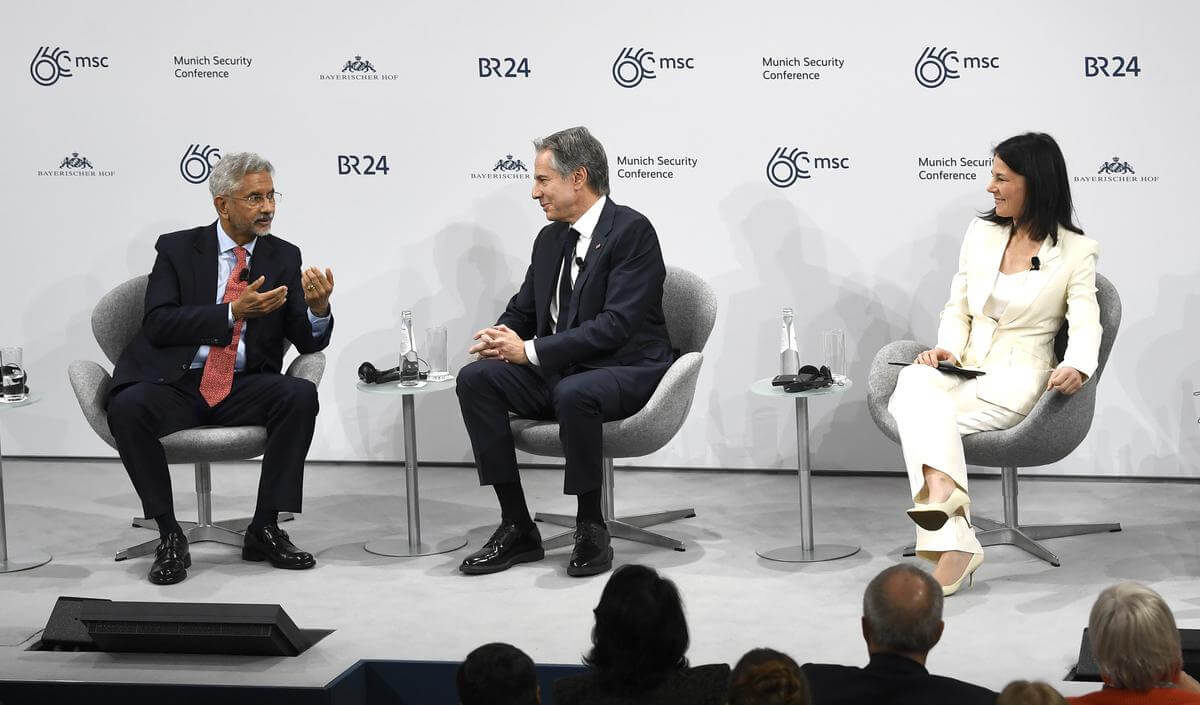On Saturday, Indian External Affairs Minister (EAM) S. Jaishankar hailed the flexible diplomatic approach of Indian foreign policy, saying that it was “smart” of New Delhi to have “multiple options.” The remarks were made as the EAM participated in a panel discussion at the 60th Munich Security Conference (MSC) alongside US Secretary of State Antony Blinken and German Foreign Minister (FM) Annalena Baerbock.
India Smart Enough to Have Multiple Options
When questioned about Indian foreign policy shifting from “non-alignment to all alignment,” Jaishankar said, “Is that a problem, why should that be a problem? If I am smart enough to have multiple options, you should be admiring me, not criticising me.”
Panel discussion at the @MunSecConf.#MSC2024 pic.twitter.com/oJ5m652aBz
— Dr. S. Jaishankar (@DrSJaishankar) February 17, 2024
The EAM backed India’s decision to buy oil from Russia despite Western sanctions. “We try to explain what are the different pulls and pressures which countries have and it’s very hard to have a unidimensional relationship,” he explained.
“Different countries and different relationships have different histories,” the EAM asserted. He added that while India gets along with people, different levels of development and experiences drive a country’s choices. “Good partners provide choices, smart partners take some of those choices,” Jaishankar stated.
Differentiating Between ‘Non-West’ and ‘Anti-West’
When questioned whether the development of BRICS poses a challenge to the West, Jaishankar said, “BRICS started in an era where Western dominance was very strong.” He highlighted the geographical diversity of the grouping and hailed its success.
Calling for a clear distinction between being “Non-West” and “Anti-West,” Jaishankar said that India is a Non-West country that enjoys extremely strong ties with the West. Hinting at China and Russia, Jaishankar said that not every BRICS member might qualify for this description.
BRICS countries include Brazil, Russia, India, China, South Africa, Egypt, Ethiopia, Saudi Arabia and the UAE. Blinken agreed with the EAM’s remarks and said that India being a leading member of the grouping does not affect its ties with the US.
Remarks on Israel-Gaza
Speaking on the Israel-Hamas War at the conference, Jaishankar listed out four dimensions to the issue. While calling Hamas’ 7 October attack on Israel “terrorism,” Jaishankar highlighted the need for Israel to prevent civilian casualties and observe humanitarian law.
Additionaly, he underlined the need to return hostages and called for a sustainable humanitarian corridor. Urging a permanent fix to the conflict, he reiterated India’s support for a two-state solution. The EAM said that, today, many more countries feel that the need for a two-state solution is more urgent than it was before.
Meetings with Other FMs
On the MSC sidelines, Jaishankar met Armenian FM Ararat Mirzoyan. The two leaders discussed the normalisation process of Armenia-Azerbaijan ties. The EAM also met with the Palestinian FM Riyad al-Maliki with whom he exchanged views on the conflict in Gaza.
Very pleased to meet FM @AraratMirzoyan of Armenia this morning as I conclude engagements around the #MSC2024.
— Dr. S. Jaishankar (@DrSJaishankar) February 18, 2024
Look forward to taking our partnership further. pic.twitter.com/dhNLqYPZ7n
Additionally, Jaishankar held a meeting with Bangladeshi PM Sheikh Hasina, during which the latter asserted the need to increase bilateral trade using national currencies, namely, the Taka and the Indian Rupee. The Indian minister also interacted with Munich Young Leaders for 2023, urging them to take a positive approach towards global challenges.
The EAM also met his British, Bulgarian, Chinese, Canadian, European, Peruvian, Polish, Portuguese and Saudi counterparts, and held meetings with the German, Argentinian and Greek defence ministers as well.

